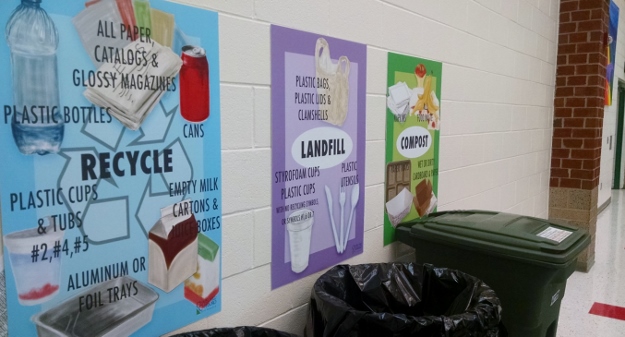CHAPEL HILL/CARRBORO SCHOOLS DIVERT 32,940 POUNDS OF TRASH FROM LANDFILL

Credit: Chapel Hill-Carrboro City Schools
Dan Schnitzer’s job is to prove that sustainability pays off for Chapel Hill-Carrboro City schools. So far, the numbers are adding up.
A district-wide composting and waste education effort, funded by savings from more efficient dumpster use, has led to these impressive results since the school year’s start ten weeks ago:
• 19 bags of lunch trash generated daily by 15 schools, down from 155 last year
• 32,940 pounds of waste diverted from the landfill
• 12.5 metric tons of carbon dioxide emissions prevented
• 2.5 metric tons of carbon dioxide emissions absorbed through creation of compost
• 87 percent reduction in cafeteria landfill waste
When Schnitzer began his role as the school district’s first full-time sustainability coordinator last November, a transition from styrofoam to compostable cafeteria trays was already underway with assistance from an organization called Every Tray Counts. This year, all elementary and middle schools became involved, with 8,000 students separating compostable, recyclable, and landfill waste every day in cafeterias across the district.
The transition was an incredibly collaborative process between parents, teachers, students, custodians, food service staff and composting companies, says Schnitzer. Volunteers contributed more than 500 hours during the first two weeks of the school year to get the project off the ground.
Schnitzer has been able to position the composting program as self-sustaining by funding it through cost-savings from a reduction of trash removal inefficiencies.
“We did a dumpster audit to look at how we can be more efficient and saw that we were literally throwing away money,” he says. Like other businesses, schools pay every time a dumpster is picked up. The audit showed that, over a period of weeks, many dumpsters were picked up partially empty. By looking at patterns of use and strategically switching the days of removal, they reduced the number of weekly pick-ups at many schools from three to two, and removed some dumpsters from service altogether. The money saved in the trash line item of the budget was then freed up for compostable waste programming.
Schnitzer, with a graduate degree in Environmental Management and Sustainability, spent six years helping manage an environmental charter school in Chicago. This background, as well as his experience directing an overnight summer camp, taught him about the challenges schools face in balancing priorities with financial, education, and environmental impacts. He looks for ways to save money and then leverage that savings in smarter ways.
“That’s the perspective I bring to this job: an understanding that there are competing pressures and priorities in the district,” says Schnitzer. “Part of the challenge is that changes don’t always benefit everyone. Sometimes things are less convenient or take more time and work.” He tries to figure out what motivates people and frame sustainability in those terms. “It takes a leap of faith to invest money upfront with a spreadsheet for later gain,” says Schnitzer.
While other NC school districts, like Granville County for example, have recycling coordinators, Schnitzer’s role is unique in breadth of reach across the school system. He engages with food service employees, facilities management, teachers, parents, school garden coordinators, custodial staff, and others as project partners.
Schnitzer’s next plans for the school district will target improvement of light and energy use through LED upgrades and better efficiency. “We’re working hard to optimize what we have, by making sure time schedules are set and running properly, and by looking at usage patterns in different areas of the buildings.”
Educational opportunities are even more important than the immediate environmental gains of sustainability initiatives in schools, says Schnitzer. “Parents and teachers are not tangential. If we’re not teaching the kids these lessons, then we’re missing 90 percent of the impact.”
While science class provides a clear opportunity to teach about environmental topics like waste and conservation, lessons of sustainability can be relevant across the curriculum through reading assignments, tasks, and exercises framed around these issues. For example, Schnitzer had the chance to discuss waste management with a graphics design class that created art for the district’s sustainability logo and signage for the composting initiative.
“I believe an entire school curriculum can be built at any grade level around a school garden” says Schnitzer. “Sustainability issues affect everyone.”
- Categories: